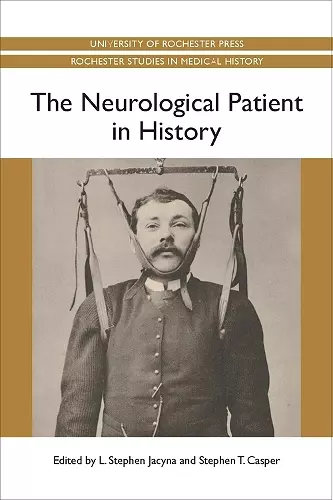The Neurological Patient in History
Professor Stephen Casper author L Stephen Jacyna author
Format:Paperback
Publisher:Boydell & Brewer Ltd
Published:1st Jan '14
Currently unavailable, and unfortunately no date known when it will be back

Essays from noted contributors trace the evolution of the neurological patient's role, treatment, and place in the history of medicine. Parkinson's, Alzheimer's, Tourette's, multiple sclerosis, stroke: all are neurological illnesses that create dysfunction, distress, and disability. With their symptoms ranging from impaired movement and paralysis to hallucinationsand dementia, neurological patients present myriad puzzling disorders and medical challenges. Throughout the nineteenth and twentieth centuries countless stories about neurological patients appeared in newspapers, books, medical papers, and films. Often the patients were romanticized; indeed, it was common for physicians to cast neurological patients in a grand performance, allegedly giving audiences access to deep philosophical insights about the meaning of life and being. Beyond these romanticized images, however, the neurological patient was difficult to diagnose. Experiments often approached unethical realms, and treatment created challenges for patients, courts, caregivers, and even for patient advocacy organizations. In this kaleidoscopic study, the contributors illustrate how the neurological patient was constructed in history and came to occupy its role in Western culture. Stephen T. Casper is assistant professor in Humanities and Social Sciences at Clarkson University. L. Stephen Jacyna is reader in the History of Medicine and Director of the Centre for the History of Medicine at University College London.
This collection adds up to a very welcome and readable widening of standard medical accounts of the history of neurology. Readers, medical and non-medical, can thus turn to the book for information, for appreciation of what historians have and have not done, and for stimulus from the range of contemporary practice in the history of medicine. * BULLETIN OF THE HISTORY OF MEDICINE *
This book is very readable, and its chapters achieve a good deal of coherence. The two final parts closely analyze the place of the patient in the evolution of the discipline [of neurology]. Taken together with the Introduction, they form a brilliant frame for the other articles in this collective work. * GESNERUS *
An important contribution to the field that promises to elicit further research by these and other scholars committed to exploring what makes the neurological patient so intriguing-not just for medical history, but for the field of history in general. * H-NET *
An important and imaginatively organized contribution to the largely unstudied -- but crucial -- history of the interaction between specialization, disease concepts, patient needs, and clinical practice. This book is relevant to any serious student of medical history or the sociology of medicine. -- Charles E. Rosenberg, professor of the history of science, and the Ernest E. Monrad Professor in the social sciences, Harvard University
The Neurological Patient in History is a valuable and welcome addition to the historiography. It not only places the neurological patient firmly in the spotlight, it also encourages readers to re-examine the patient using fresh and thought-provoking lines of enquiry.... This volume will be used as a reference text for years to come. * REVIEWS IN HISTORY *
A satisfyingly eclectic account of how patients have been diagnosed and treated and how they have experienced health and illness during the last one hundred and fifty years. There are many fine contributions to this volume. * AMERICAN HISTORICAL REVIEW *
ISBN: 9781580464758
Dimensions: unknown
Weight: 397g
274 pages